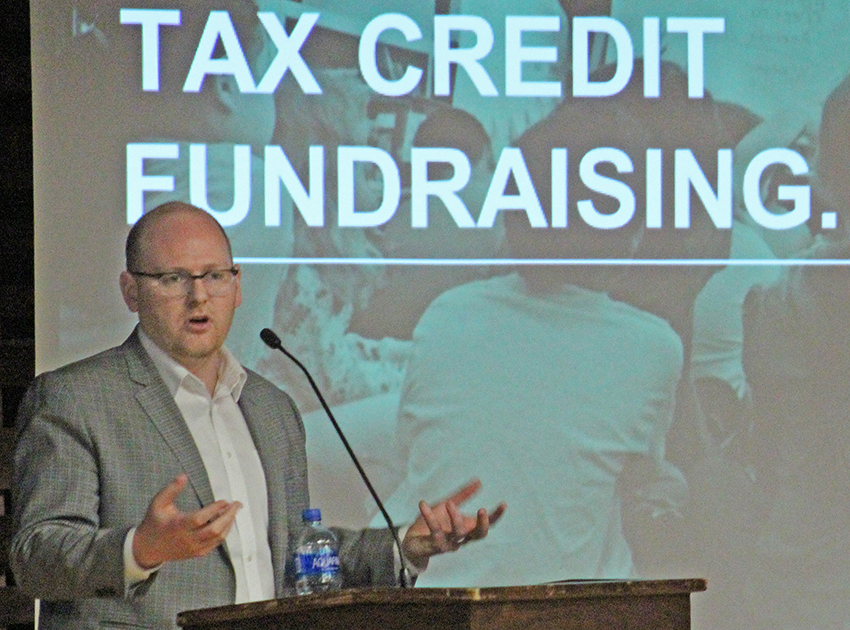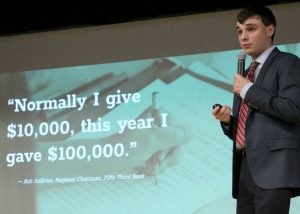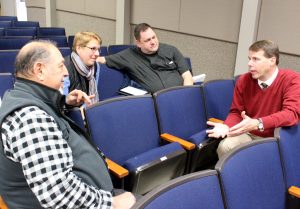Spreading the good news about benefits of state’s tax credit scholarship program

Dr. Anthony Holter, executive director of Empower Illinois, gives an overview of the Invest in Kids Act during a workshop for Catholic school leaders on Nov. 15 at Peoria Notre Dame High School. (The Catholic Post/Jennifer Willems)
Committed to making the second year of the tax credit scholarship program better than the first year, leaders from Empower Illinois recently worked with Catholic school principals, pastors and teams from around the Diocese of Peoria to deepen their understanding of the Invest in Kids Act and help them brainstorm ways to spread the word about the benefits for all concerned.
Sponsored by the diocesan Office of Catholic Education, the meeting was held Nov. 15 in the auditorium of Notre Dame High School in Peoria. Among the speakers were Dr. Anthony Holter, executive director of Empower Illinois; Bobby Sylvester, the scholarship granting organization’s regional director for the Diocese of Peoria; and Juan Rangel, strategy director for Empower Illinois.
Also offering words of support and a promise of help was Dan Daley, president and CEO of SENB Bank in the Quad Cities and a member of the Empower Illinois board of directors.

Bobby Sylvester, regional director for Empower Illinois, talks about the benefits of tax credit scholarships and the impact they have on families in need during a workshop for Catholic school leaders in Peoria on Nov. 15. (The Catholic Post/Jennifer Willems)
“We care about (the Diocese of) Peoria and that’s why we’re here. We want to see your schools thrive,” Sylvester said. “You have a great, great mission and students and faculties, and we just want to provide an opportunity for more kids to go there and that cost no longer needs to be an obstacle to a Catholic education.”
Holter reminded his listeners that the Invest in Kids Act was passed in August 2017 with strong bipartisan support. The five-year pilot program went into effect Jan. 1, 2018.
Those who make a donation to a qualified SGO receive a tax credit for 75 percent of that amount. Non-public schools benefit because individuals may designate which school or system, including dioceses, will receive the funds.
“Upwards of 85 percent of our donations were designated to schools, so designation is the name of the game at this point in time,” Sylvester said.
The program allows up to $100 million a year to be raised, resulting in $75 million in tax credits being available, according to Holter, and this applies to anyone with a tax liability in the State of Illinois.
“We want to get to $100 million and we’re making good progress,” he said. “We’re at about $47 million, but $100 million isn’t our ceiling. We’re thinking, ‘What’s next? What’s beyond five years? What’s beyond $100 million?’”
PLANNING BEGUN
The tax credit scholarships are intended to assist families who are in financial need — those that earn up to 300 percent of the federal poverty level, Holter said.
Sylvester noted that during the first year, 75 percent of scholarships were awarded to students within 185 percent of the federal poverty level — about $45,000 for a family of four.
To help school officials develop a fundraising plan to assist these students, Sylvester walked them through some ideas and then turned it over to them to do some brainstorming. Key points included:
- Talk about the impact the tax credit scholarships will have. “People who are giving, whether they know your school or not, they’re giving because they care about education, they care about kids.”
- Talk to existing donors first. This builds momentum, Sylvester said.
- Share success stories.
- Ask, ask, ask. “It’s not enough to come into a room full of people and say, ‘This is a great program.’ Sit down with people. Explain the program. Ask if they will support the program,” he said.
Tax credit scholarships will continue to be awarded for this school year with donations received by Nov. 30. Donations received on Dec. 1 or later will be used to make awards during the next school year.
Donations made by the end of this calendar year can still be used to apply for a tax credit against an individual’s 2018 tax liability, regardless of when the scholarship is awarded.
“WE HAVE TO MAKE IT WORK”
Advocacy for the tax credit scholarship program may not be the reason the school and parish leaders attended the meeting, but it may be necessary for it to continue, said Rangel.

Jerry Sanderson, associate superintendent of schools for the Diocese of Peoria, makes a point during a discussion with (from left) Joe McDaniel, co-principal at Holy Cross in Champaign, and Anita Kobilsek, principal, and Father Peter Pilon, pastor, of Holy Cross in Mendota. (The Catholic Post/Jennifer Willems)
The mid-term elections saw losses among some champions of the Invest in Kids Act and wins among its foes. He noted that Governor-elect J.B. Pritzker mentioned several times on the campaign trail that he would kill the law if he won the election.
“Having said all that, I am still very optimistic,” Rangel said. “I’m optimistic because there are still come champions that want to help us and we have to make it easier for them to come on board publicly, make it safe for them publicly.”
That means it’s up to the program’s advocates to make it work, he explained.
“We have to make it work and it will be held against us if we don’t make it work. We have no choice,” Rangel said. “It’s an imperfect law, as all laws are, but we have to make it work.”
For more information on the Invest in Kids Act, click here. Information is also available at empowerillinois.org.





